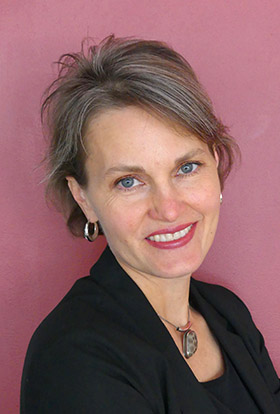HERS ALUMS
Biography
Dr. Laura Furge is currently the Dorothy H. Heyl Professor of Chemistry at Kalamazoo College in Michigan and will soon be the new Provost of Muhlenberg College in June 2021. Dr. Furge earned her bachelor’s in biochemistry from Oberlin College and completed her Ph.D. and a postdoctoral fellowship in biochemistry from Vanderbilt University. In addition to her classroom and laboratory roles, Dr. Furge has held several administrative appointments at Kalamazoo, including terms as interim provost and associate provost.
Right after Dr. Furge completed the HERS Leadership Institute in the summer of 2018, she became the Interim Provost at Kalamazoo. She shared how the institute prepared her to step into that role with newfound skills and confidence.
Alum Q&A
What brought you to the HERS Leadership Institute? What was your role or title when you attended, and did anyone encourage or support your attendance?
Dr. Adele Wolfson at Wellesley College, a long-time friend, and colleague from biochemistry education circles, encouraged me to apply for HERS and the Clare Booth Luce Fellowship for Women in STEM. At that time, I was in my second year as the Associate Provost, a rotating faculty position at Kalamazoo College. I had also been Chair of the Chemistry Department and Chair of the Science Division.
What do you value most from your Leadership Institute Experience?
So many great new friends and colleagues! Learning, collaborating, engaging, and having fun with 70+ other women from many different areas of higher ed was highly impactful. The collective knowledge of my cohort, and other HERS alumnae I’ve met, has given me a more complete understanding of leadership in higher ed, how to collaborate across units, how to speak the same language, and how to build partnerships. The speakers and facilitators were also great and challenged me to grow.
Of the curriculum modules, which stuck out to you the most and why?
All of the curriculum modules were relevant and encouraged deeper, as well as broader, thinking. Of particular importance for me were the modules on diversity and inclusivity and models for influencing others/creating buy-in. The sessions on “next steps” were invaluable in building my self-awareness and the professional tools to be a candidate, not an applicant.
What from the curriculum and experience at HERS did you immediately bring back to your institution and colleagues?
When I finished the Leadership Institute, I returned to campus and immediately assumed the interim provost role of my home institution. The institute prepared me to step into that role with confidence, collaborate across units, and think broadly about the institutional needs. Additionally, the intentional focus at HERS on diversity, equity, and inclusivity from many perspectives helped me to launch a new initiative funded by the HHMI for Inclusive Excellence at my institution.
What advice would you give to a woman who wants to advance their higher education career but is uncertain as to when and how to do it?
If you are still trying to decide if you want to move into leadership roles at your institution or elsewhere, as I was before I went to HERS, you should participate in the Leadership Institute. The experiences there with women in various leadership roles, including both participants and guest speakers, will give you additional tools and insights into evaluating your leadership skills, motivations, and career trajectory. It’s truly about strengthening higher ed by tooling leaders in all areas to do their work most effectively across multiple institutional leadership levels and departments.
How would you describe your cohort?
My HERS sisters were and continue to be incredibly affirming, supportive, and encouraging. They are also a fun bunch! We shared a lot of ourselves during our two weeks together that has allowed us to continue to connect, seek advice, share our experiences, and grow professionally in our sometimes very different roles and institutional types. And, we can connect to simply say, “Hey, I was thinking about you this week and hope all is going well.” We are friends, and we stay connected on social media or occasionally when we see each other in real-time at conferences like AACU.

As one of our partners, you can be a leader behind much-needed change in the educational sector. Support for our programs drives leadership equity, enabling institutions to better support an increasingly diverse student body and better prepare their students to create a more equitable society.